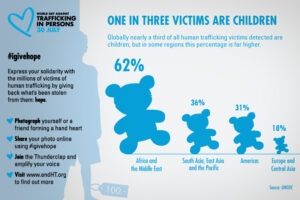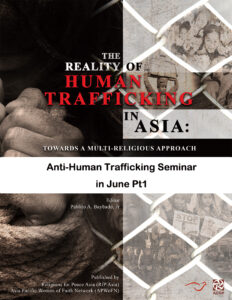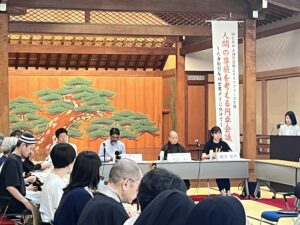 “Leave No Child Behind in the Fight Against Human Trafficking”
“Leave No Child Behind in the Fight Against Human Trafficking”
~One out of every three victims of trafficking in the world is a child~
Human trafficking includes a wide range of issues such as sexual exploitation, forced labor, organ trafficking, child labor, domestic servitude, and forced to commit crimes.
As of 2021, 50 million people worldwide are living as “modern slaves”, among whom 28 million are in forced labor, and 22 million are in forced marriages.
Compared to the previous global estimate released in September 2017 (as of 2016), the number of people in modern slavery as of 2021 increased by over 10 million, indicating that women and children remain disproportionately vulnerable.
Especially among trafficking victims worldwide, children make up a significant percentage, and the gender determines that girls are more likely to be trafficked for sexual exploitation and boys for forced labor.
According to Daniela Knoppik, Program Officer of Migration and Displacement at UNICEF, children are subjected to physical or extreme violence at the rate almost two times higher than adults.
She also mentioned that displaced and migrant children are especially vulnerable to trafficking; whether they are escaping war and violence or pursuing education and livelihood opportunities, too few children find pathway to move regularly and safely. Instead, they turn to irregular routes. Children who move on their own are particularly at risk of violence, abuse and exploitation. Conflict increases highly the number of victims of trafficking children, and the digital technology is playing a growing role in facilitating the trafficking of children.
One of the Religions for Peace Asia (ACRP) flagship projects is the prevention of human trafficking. To spread awareness of the realities of the human trafficking issue, ACRP has repeatedly conducted awareness-raising activities for religious leaders, activists, and the general public, through online seminars, online visits to shelters caring for victims, and roundtable discussions and more. In recent years, the Asia Pacific Women of Faith Network (APWOFN), one of the ACRP’s networks, has been working on a project to identify this issue as one of the most serious issues to be addressed. In 2020, each APWoFN member researched and presented the issues of human trafficking in their countries, with a focus on children and women in the online seminar. Their achievements are now available as a digital report on the ACRP’s WEB.
In recent years, the Asia Pacific Women of Faith Network (APWOFN), one of the ACRP’s networks, has been working on a project to identify this issue as one of the most serious issues to be addressed. In 2020, each APWoFN member researched and presented the issues of human trafficking in their countries, with a focus on children and women in the online seminar. Their achievements are now available as a digital report on the ACRP’s WEB.
(https://rfpasia-tokyo.org/act-report/e-book-report/anti-human-traffickin-seminar-digital-reports/)
In 2024, the Women’s Network will conduct a three-day workshop with various religions leaders and activists through lobbying and advocacy activities.
The issue of human trafficking varies from country to country. However, most victims are women and children (young adults). We, unknowingly, could also be victims or perpetrators of this problem. We, as faith leaders, continue our activities in the hope that such advocacy trainings will help people understand this issue and expand awareness-raising activities in various countries. It is important for religious people, who have a pivotal role in connecting people’s hearts (spirituality), to address to this issue seriously.
We, as faith leaders, continue our activities in the hope that such advocacy trainings will help people understand this issue and expand awareness-raising activities in various countries. It is important for religious people, who have a pivotal role in connecting people’s hearts (spirituality), to address to this issue seriously.  The word “ocean” is identified differently in each country. However, there is no difference in the essence of the ocean. In the same way, there is no difference in the essence of “human beings,” and we must protect the equal dignity of life.
The word “ocean” is identified differently in each country. However, there is no difference in the essence of the ocean. In the same way, there is no difference in the essence of “human beings,” and we must protect the equal dignity of life.
Religious people have a major role to play in changing the world through our own presence and commitment. We must take the initiative to nurture the caring for others and to cultivate human character and moral values.
Asia is the continent where the world religions originated, and countries with different languages, cultures, and religions have come together to make one “Asia”. However, it is also true that large number of Asian populations suffers from problems such as conflict and poverty. What each of us can do is to repeatedly strive for a “living dialogue” that transcends our differences. Issues in Asia should be solved concretely together by those of us who live in Asia, beyond the borders of religions and cultures.
********
VIDEO Report on Anti-Human Trafficking 2020
<Part 1>
https://rfpasia.org/publication-resource/video/a-virtual-symposium-on-modern-day-slavery-day-1-highlights-june-22/
<Part 2>
https://rfpasia.org/publication-resource/video/a-virtual-symposium-on-modern-day-slavery-day-2-highlights-june-23/
APWoFN Anti-Human Trafficking Seminar Digital Report 2022
(https://rfpasia-tokyo.org/act-report/e-book-report/anti-human-trafficking-seminars-digital-report/)
